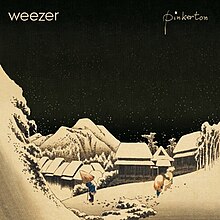Pinkerton (album)
| Pinkerton | ||||
|---|---|---|---|---|
 |
||||
| Studio album by Weezer | ||||
| Released | September 24, 1996 | |||
| Recorded | September 1995, January–June 1996 | |||
| Studio | Sound City, Los Angeles; Fort Apache Studios, Boston; Hollywood Sound Recorders, Los Angeles; Rumbo Recorders, Canoga Park; Electric Lady Studios, New York City | |||
| Genre | ||||
| Length | 34:36 | |||
| Label | DGC | |||
| Producer | Weezer | |||
| Weezer chronology | ||||
|
||||
| Singles from Pinkerton | ||||
|
||||
| Professional ratings | |
|---|---|
| Review scores | |
| Source | Rating |
| AllMusic | |
| American Songwriter | |
| Entertainment Weekly | B |
| Los Angeles Times | |
| NME | 7/10 |
| Pitchfork | 10/10 |
| Q | |
| Rolling Stone | |
| The Rolling Stone Album Guide | |
| Spin | 7/10 |
Pinkerton is the second studio album by American rock band Weezer, released on September 24, 1996 on DGC Records. After abandoning plans for a rock opera titled Songs from the Black Hole, Weezer recorded Pinkerton between songwriter Rivers Cuomo's terms at Harvard University, where he wrote much of the album. It was the last Weezer album to feature bassist Matt Sharp.
To better capture their live sound, Weezer produced Pinkerton themselves, creating a darker, more abrasive album than their 1994 self-titled debut. Cuomo's lyrics express disillusionment with the rock lifestyle; the album is named after the character BF Pinkerton from Giacomo Puccini's 1904 opera Madama Butterfly, whom Cuomo described as an "asshole American sailor similar to a touring rock star". Like the opera, the album contains references to Japanese culture.
Pinkerton produced three singles: "El Scorcho", "The Good Life" and "Pink Triangle". It debuted at number 19 on the US Billboard 200 and fell short of sales expectations after the success of Weezer's debut. It initially received mixed reviews, but went on to achieve cult status and wide acclaim years later; the 2010 "Deluxe Edition" reissue holds a perfect score on aggregate review website Metacritic.
In 1994, after the multi-platinum success of Weezer's self-titled debut album, Weezer took a break from touring for the Christmas holidays. In his home state of Connecticut, songwriter Rivers Cuomo began preparing material for Weezer's next album using an 8-track recorder. His original concept was a science fiction rock opera titled Songs from the Black Hole that expressed his mixed feelings about success. Weezer developed Songs from the Black Hole through intermittent recording sessions throughout 1995.
...
Wikipedia
